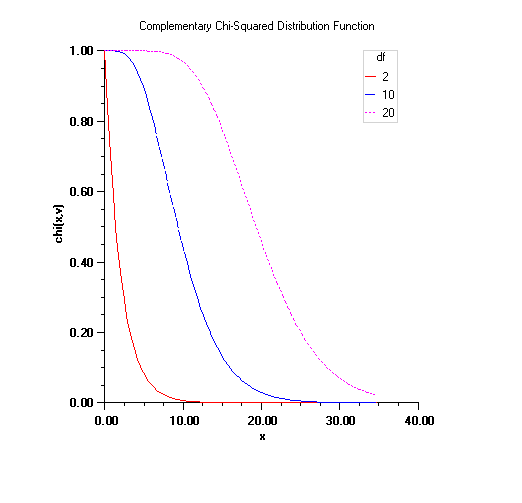| CdfComplementaryChi Method |
Namespace: Imsl.Stat
Assembly: ImslCS (in ImslCS.dll) Version: 6.5.2.0
Parameters
- chsq
- Type: SystemDouble
A double scalar value at which is to be evaluated.
is to be evaluated.
- df
- Type: SystemDouble
A double specifying the number of degrees of freedom. This must be at least 0.5.
Return Value
Type: DoubleA double specifying the probability that a chi-squared random variable takes a value greater than chsq.
where ![]() is the gamma
function. The value of the distribution function at the point
x is the probability that the random variable takes a value
greater than x.
is the gamma
function. The value of the distribution function at the point
x is the probability that the random variable takes a value
greater than x.
For ![]() , Cdf.ComplementaryChi uses the
Wilson-Hilferty approximation (Abramowitz and Stegun 1964, equation
26.4.17) to the one minus the normal distribution, and method
Cdf.Normal is used to evaluate the normal distribution function.
, Cdf.ComplementaryChi uses the
Wilson-Hilferty approximation (Abramowitz and Stegun 1964, equation
26.4.17) to the one minus the normal distribution, and method
Cdf.Normal is used to evaluate the normal distribution function.
For ![]() , Cdf.ComplementaryChi
uses series expansions to evaluate the distribution function. If
, Cdf.ComplementaryChi
uses series expansions to evaluate the distribution function. If
![]() , Cdf.ComplementaryChi uses
the series 6.5.29 in Abramowitz and Stegun (1964), otherwise, it
uses the asymptotic expansion 6.5.32 in Abramowitz and Stegun.
, Cdf.ComplementaryChi uses
the series 6.5.29 in Abramowitz and Stegun (1964), otherwise, it
uses the asymptotic expansion 6.5.32 in Abramowitz and Stegun.
